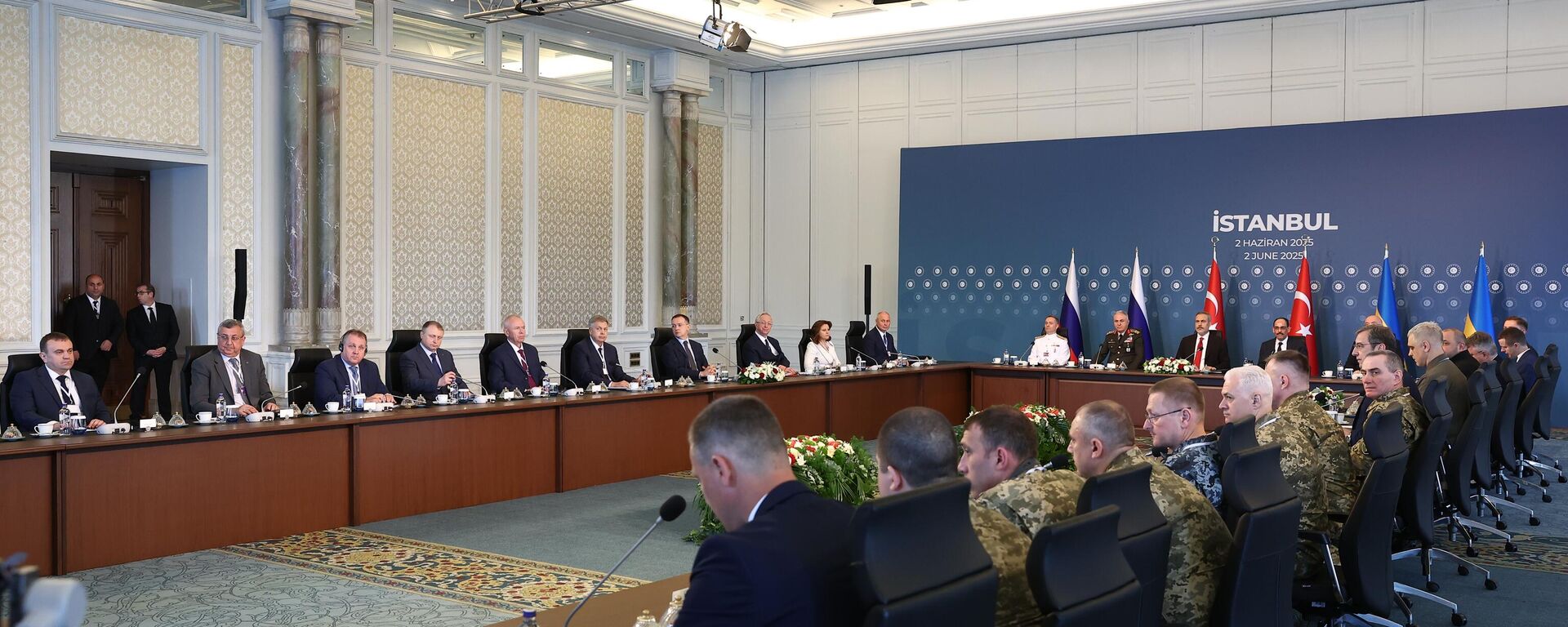https://sputnikglobe.com/20250602/ukraine-risks-trumps-wrath-if-it-snubs-russias-humanitarian-ceasefire-idea-1122178003.html
Ukraine Risks Trump’s Wrath if it Snubs Russia’s Humanitarian Ceasefire Idea
Ukraine Risks Trump’s Wrath if it Snubs Russia’s Humanitarian Ceasefire Idea
Sputnik International
Dmitry Suslov, deputy director of research at the Russian Council on Foreign & Defense Policy, breaks down the key takeaways from Monday’s Russia-Ukraine peace talks in Istanbul, including one Russian proposal he finds particularly clever.
2025-06-02T18:50+0000
2025-06-02T18:50+0000
2025-06-02T18:50+0000
analysis
donald trump
ukraine
russia
istanbul
nato
us
https://cdn1.img.sputnikglobe.com/img/07e9/06/02/1122177842_0:201:2927:1847_1920x0_80_0_0_2fa3a8f5f35d39c935d5504d384cb24b.jpg
“Trump wants a ceasefire, everyone is talking about a ceasefire, so Russia is proposing a humanitarian ceasefire. Not the [30 day] kind that Ukraine and Europe insist on, which would be used by Ukraine’s military to regroup, and pump the armed forces up with weapons, but a humanitarian ceasefire,” Suslov told Sputnik.“It’s impossible to fundamentally improve one’s positions on the battlefield in two days. But the humanitarian effect would be immense,” according to the observer. Specifically:If Ukraine refuses, it will risk angering Trump, Suslov pointed out.Best Possible OutcomeMonday’s humanitarian issue-focused negotiations were basically “the best possible results possible in the current conditions, when the positions of the two sides fundamentally diverge,” and especially so given Ukrainian attempts to sabotage the talks.With Ukraine insisting on a 30-day ceasefire, rejecting demilitarization or a freeze in mobilization, and rejecting any restrictions on military cooperation with NATO, the humanitarian track was the only one where agreements could be reached, proving that Russia is interested in the diplomatic track, Suslov said.
https://sputnikglobe.com/20250602/russia-ukraine-talks-round-2-kievs-memorandum-is-ultimatum-dressed-as-diplomacy-1122177660.html
ukraine
russia
istanbul
2025
News
en_EN
https://cdn1.img.sputnikglobe.com/img/07e9/06/02/1122177842_99:0:2830:2048_1920x0_80_0_0_d20de0da2bd192d320518b88f7c84e19.jpg
russia-ukraine peace talks, russia-ukraine peace talks in istanbul, russia ukraine peace negotiations, us, donald trump
russia-ukraine peace talks, russia-ukraine peace talks in istanbul, russia ukraine peace negotiations, us, donald trump
Dmitry Suslov, deputy director of research at the Russian Council on Foreign & Defense Policy, breaks down the key takeaways from Monday’s Russia-Ukraine peace talks in Istanbul, including one Russian proposal he finds particularly clever.
“Trump wants a ceasefire, everyone is talking about a ceasefire, so Russia is proposing a humanitarian ceasefire. Not the [30 day] kind that Ukraine and Europe insist on, which would be used by Ukraine’s military to regroup, and pump the armed forces up with weapons, but a humanitarian ceasefire,” Suslov told Sputnik.
“It’s impossible to fundamentally improve one’s positions on the battlefield in two days. But the humanitarian effect would be immense,” according to the observer. Specifically:
If Ukraine refuses, it will risk angering Trump, Suslov pointed out.
Monday’s humanitarian issue-focused negotiations were basically “the best possible results possible in the current conditions, when the positions of the two sides fundamentally diverge,” and especially so given Ukrainian attempts to sabotage the talks.
With Ukraine insisting on a 30-day ceasefire, rejecting demilitarization or a freeze in mobilization, and rejecting any restrictions on military cooperation with NATO, the humanitarian track was the only one where agreements could be reached, proving that Russia is interested in the diplomatic track, Suslov said.


